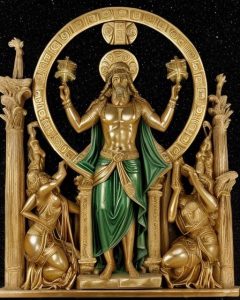Saturnalia, an ancient Roman festival dedicated to the revered deity Saturn, finds its origins deeply rooted in a long-forgotten era, specifically celebrated annually in ancient Rome during the late December period. This festival symbolizes the culmination of the agricultural year and the arrival of winter, with festivities commencing on December 17th and lasting for a joyous seven days, concluding on December 23rd.
Saturnalia, known for its exuberant and joyous celebrations, stands out as one of the most anticipated events of the year in ancient Rome. During this time, societal norms temporarily took a backseat, allowing people the freedom to engage in lavish feasting, extravagant gift-giving, and all-around merry-making. The festival created a temporary reversal of social hierarchies, where masters assumed the roles of servants, fostering a fleeting atmosphere of equality and shared experiences.
A standout ritual during Saturnalia involved the exchange of gifts, symbolizing collective optimism for good fortune and prosperity in the forthcoming year. Homes were adorned with vibrant greenery like holly and ivy, accompanied by sparkling candles to ward off malevolent spirits. This festive ambiance extended to educational institutions, judicial proceedings, and businesses, which suspended their activities for the week.
Saturnalia also encompassed a diverse range of entertainment, including musical performances, lively dances, and games of chance, contributing to the overall atmosphere of joy and merriment. The festival served as a grand occasion that brought people together in celebration and unity, offering a glimpse into a world where social hierarchies momentarily diminished, granting individuals a taste of freedom and liberation from conventional societal norms.
In conclusion, Saturnalia was a time to honor the Roman god Saturn, expressing gratitude for the bountiful harvest and welcoming the promise of spring. This ancient festival permeated interactions with the virtues of generosity and goodwill, creating a cultural and religious phenomenon celebrated not only in Rome but also in various parts of the Roman Empire.




